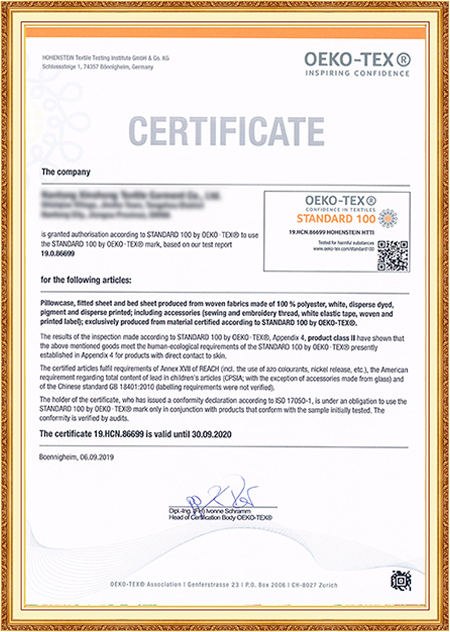Bamboo Fiber Duvet Covers: A Year-Round Solution for Temperature Regulation
Choosing the right duvet cover is essential for a good night's sleep. Bamboo fiber duvet covers stand out because they can regulate temperature, making them perfect for all seasons. This article explores how bamboo fiber keeps you comfortable year-round.
What is Bamboo Fiber?
Bamboo fiber is made from the bamboo plant, known for being soft, durable, and eco-friendly. The material is naturally breathable and helps with temperature control, making it great for bedding.
How Bamboo Fiber Regulates Temperature
Breathability:Bamboo fiber has a structure that allows air to flow, which helps release heat and keep you cool.
Moisture-Wicking:Bamboo fiber absorbs moisture quickly, keeping you dry and comfortable, especially during hot nights.
Insulation:Bamboo fiber also retains heat, keeping you warm in colder weather, making it useful year-round.
Bamboo Fiber Duvet Covers for All Seasons
Summer:In summer, bamboo fiber keeps you cool and dry by allowing air circulation and wicking away sweat.
Winter:In winter, bamboo fiber retains warmth without causing overheating, providing a cozy sleep environment.
Spring and Autumn:During these seasons, bamboo fiber adapts to changing temperatures, offering comfort regardless of the weather.
Health Benefits of Bamboo Fiber
Hypoallergenic:Bamboo fiber is naturally resistant to allergens like dust mites, making it great for people with allergies.
Antimicrobial:Bamboo fiber also resists bacteria and fungi, keeping your bedding cleaner and more hygienic.
Gentle on Skin:The softness of bamboo fiber makes it gentle on the skin, reducing irritation.
Environmental Benefits of Bamboo Fiber
Sustainable Resource:Bamboo grows quickly and doesn't need replanting, making it a sustainable choice.
Low Environmental Impact:Bamboo requires less water and no pesticides, making its production eco-friendly.
Biodegradable:Bamboo fiber breaks down naturally, unlike synthetic materials that pollute the environment.
Comparing Bamboo Fiber to Other Materials
Cotton:Bamboo fiber is more breathable and moisture-wicking than cotton, making it more comfortable in hot conditions.
Linen:Bamboo fiber is softer and easier to care for than linen, which can be rough and wrinkle easily.
Synthetic Materials:Bamboo fiber outperforms synthetic materials in comfort and breathability, though it may cost more upfront.
Caring for Bamboo Fiber Duvet Covers
Washing:Wash bamboo fiber duvet covers in cold water on a gentle cycle to preserve the fabric.
Drying:Air drying is best, but if using a dryer, choose a low heat setting.
Storage:Store bamboo fiber duvet covers in a cool, dry place, away from direct sunlight.
Is Bamboo Fiber Right for You?
Personal Preferences:Bamboo fiber duvet covers are ideal for those who want comfort, breathability, and sustainability. They’re especially good for people who experience night sweats or live in areas with varying temperatures.
Price vs. Value:While bamboo fiber duvet covers can be more expensive, their durability, comfort, and environmental benefits make them worth the investment.
An Analysis of Bamboo Fiber Duvet Covers for Sustainable Temperature Management
Choosing the right duvet cover is crucial for comfort and energy efficiency. Bamboo fiber is becoming popular in bedding because it not only provides excellent temperature control but is also eco-friendly. This analysis looks at how bamboo fiber duvet covers regulate temperature and why they're a sustainable choice.
What is Bamboo Fiber?
Bamboo fiber is made from the bamboo plant, known for its rapid growth and minimal environmental impact. The fiber is soft, durable, and naturally breathable, making it ideal for bedding.
Temperature Regulation with Bamboo Fiber
Breathability: Bamboo fiber allows air to circulate, helping to keep you cool by releasing heat.
Moisture-Wicking: It absorbs and evaporates moisture quickly, keeping you dry even on hot nights.
Insulation: Bamboo fiber also retains heat, making it warm in winter and cool in summer.
Comparing Bamboo Fiber to Other Materials
Cotton: Bamboo is more breathable and better at wicking moisture, making it superior for temperature control.
Linen: Bamboo is softer and easier to care for than linen, which can be rough and wrinkle easily.
Synthetic Materials: Bamboo fiber is more breathable and environmentally friendly compared to synthetic fabrics, which can trap heat and are not biodegradable.
Sustainability of Bamboo Fiber
Renewable Resource: Bamboo grows quickly and doesn't need replanting, making it a sustainable crop.
Low Environmental Impact: It requires less water and no pesticides, making its cultivation eco-friendly.
Biodegradable: Bamboo fiber breaks down naturally, unlike synthetic materials that can harm the environment.
Health Benefits
Hypoallergenic: Bamboo fiber resists allergens like dust mites, making it great for people with allergies.
Antimicrobial: It naturally resists bacteria and fungi, keeping your bedding cleaner.
Gentle on Skin: The softness of bamboo fiber is ideal for sensitive skin.
Practical Considerations
Durability: Bamboo fiber is strong and long-lasting, resistant to pilling and wear.
Easy Care: It can be machine-washed and dried on low heat, and it's less prone to wrinkling.
Who Should Choose Bamboo Fiber Duvet Covers?
Climate: Ideal for places with varying temperatures or high humidity.
Eco-Conscious Buyers: Perfect for those who want sustainable products.
Allergy Sufferers: Great for people with allergies or sensitive skin.
Bamboo fiber duvet covers offer year-round comfort and sustainability. They regulate temperature effectively, are easy to care for, and have a low environmental impact. As more people seek eco-friendly and high-performance bedding, bamboo fiber is likely to become even more popular in the future.



 English
English Español
Español عربى
عربى














 +86-159 5050 0822
+86-159 5050 0822 peter@rainbowhomefashion.com
peter@rainbowhomefashion.com No.199 Yimin Road, Dateng DIstrIct, Yancheng City. Jiangsu Province, China
No.199 Yimin Road, Dateng DIstrIct, Yancheng City. Jiangsu Province, China
